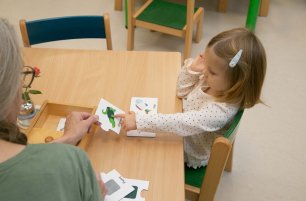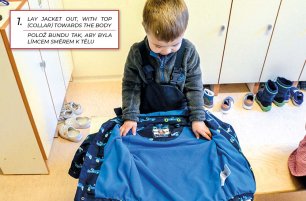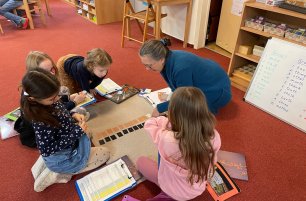Positive Language: How to turn a ‘no’ into a ‘yes’
“Life can become much easier, simply by changing the words that we use” - Alicia Eaton, AMI Montessori Teacher and Child behavioral specialist
Throughout the first six years children are experiencing a critical window of opportunity for language learning and the development of communication. More importantly, during the time from birth to three the child is doing all of this learning unconsciously, so without even realizing it they are absorbing and adapting to all of the language and behaviors around them. In these early years, as toddlers are beginning to understand language and develop their vocabulary, we need to consider how their brain is working to form these connections. Over time, words become associated with mental pictures, like when we say ball and the baby points to it or crawls to pick it up. This means that they are beginning to understand that words are used to represent something in real life.
Another key aspect of toddlers' development is that they are only obedient to what Montessori calls their horme, or their deep inner drives and impulses. Small children are not able to control their impulses or discern right from wrong, and generally once they have their mind set on doing something they will do everything in their power to fulfill that need. Children at this stage have not yet acquired the cognitive skills necessary for logical thinking, problem solving, or higher level functioning. This is important to keep in mind when we consider how our language affects their behavior.
Studies have shown that toddlers hear words like “no”, “don’t,” “not” and “stop” approximately 400 times per day. When we overuse these words, they tend to lose their meaning, and children start to tune them out. This can create problems for us because when a toddler hears “No” in a situation that is more serious or dangerous then they may not listen or realize the seriousness because they’ve already heard “no” many times. Secondly, toddlers are still developing their understanding of language, and children under three don’t have the mental images associated with “don’t” “not” or “stop”. For instance, when you say “Don’t run” or “Stop running” all your child will hear is “run”. When we phrase our wording like this, it tends to reinforce whatever negative behavior we are trying to stop.

This is why Montessori teachers use positive language, like “We walk inside” or “The paint is only for the paper” instead of “Don’t run or stop painting on the walls”. Because again, the child will only hear and understand “paint on the walls”. We say and model the behavior we want to see, rather than saying what we don’t want. When we consider the impact of our language on small children, along with where they are developmentally and the fact that they constantly hear ‘no’ and ‘don’t’ all the time, it’s no wonder our children experience stress, frustration or meltdowns throughout the day. As the adult, who has much more life experience and critical thinking skills, it is up to us to act as the logic and reason for the small child. We must offer them some appropriate alternatives, and it’s our job to help them in making good decisions, while also allowing them some freedom to make their own choices. This is why it’s so important that we are mindful of the language we use with small children. It’s through our language that we can set children up for success.
Some parents ask, how is it possible to give a child at this young age freedom to make their own choices? As we know they are often not capable of doing so, but is it because they are really not capable or is it because we have not set up the situation in a positive way where they can succeed? Consider your morning routine, sometimes it’s hard to get your child up, ready, fed and out the door on time. We often hear stories about struggles when it’s time to get ready or do something, especially when there is a time limit. Now while there are usually other factors at play here, like your child’s mood and temperament or your own feelings, language plays an absolutely key role in turning these situations from a negative to a positive interaction.
-Would you like toast or an egg for breakfast?
-Will you wear the blue shirt or the red shirt today? Do you want help or will you try by yourself?
We are using clear, concise language and allowing the child a chance to choose for themselves while we are there to guide and help as they need. The end result is eating breakfast or getting ready, but we are giving them some freedom to decide how we get there. For toddlers, we shouldn’t offer more than two options at first; we will also only offer choices that we are okay with and that are realistic and appropropriate. For instance, sometimes parents say “Do you want to go home with me or stay at the park? I’m leaving now!”, when in reality you are not going to leave the child at the park so staying there isn’t actually an option. We need to take time to think about the language we use and be sure that our words have meaning.
Toddlers have a deep inner drive to do and act in their environment; they often want to help us and participate in what we are doing throughout the day. So it’s our responsibility to think about how they can help and create opportunities for them to contribute to their home and community life. This may look like helping feed the family pet, prepare foods in the kitchen, set the table or put their dirty clothes in the bin. We can use positive language throughout all of our interactions with children:
-”You can put your shirt in the laundry bin” instead of “Don’t throw your clothes on the floor”
-”Please wash your hands before helping” rather than “Don’t touch the food, your hands are dirty!”
There will also be situations when your toddler will say “No”, sometimes to everything and even when we have tried our best to use positive language, they may still say “no”. Children at this age are testing the limits because they are learning about cause and effect, the reactions from their actions, and what happens when they do or say something. This is why it’s extremely important that we remain calm and consistent in our responses, so the child comes to learn that even though they are testing the boundaries, the limits are always the same. We can also remind them that if they don’t choose, then we will choose for them, and we must follow through consistently every time. Some days there will still be ups and downs, but overall toddlers delight in making these small decisions as it gives them some power and sense of control in their life which is so often managed by adults. You will see that nine times out of ten they respond much better to positive language. This provides an opportunity for your child to practice making choices when the stakes are low and it has a powerful effect on their confidence, self-esteem, sense of independence, and the development of their will.
If you are interested in learning more about this topic, check out Alicia Eaton’s book “Words that work - How to get kids to do almost anything” where she explains how and why words have such an effect on behavior.
By Lindsey Taylor
Want to learn more? Read our next article:








